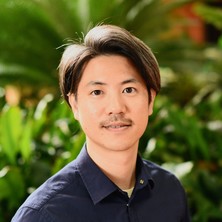
Overview
Background
Dr Daniel Liang-Dar Hwang is a genetic epidemiologist and statistical geneticist by training. His research interests include sensory nutrition, causal modelling, and personalized nutrition. Dr Hwang applies statistical models to big data to understand genetic and environmental factors contributing to individual differences in taste and olfactory perception and their relationship with dietary behaviour and chronic conditions (See his research on taste perception in The Conversation). He develops methods for increasing statistical power for gene discovery, estimating intergenerational causal relationships, and personalized intervention. He also works with clinicians to investigate impaired chemosensory perception in cancer patients and COVID-19.
Daniel has a B.Sc from the National Taiwan University, majoring in Biochemical Science and Technology, and an M.Biotech from the University of Pennsylvania. Following graduation, he worked as a research technician in Danielle Reed's lab at the Monell Chemical Senses Center, where he first developed a keen interest in genetics and chemosensory perception. Later, he was awarded scholarships to complete an M.Sc in Nutrition at the University of Washington, under the supervision of Glen Duncan, and a PhD in Genetic Epidemiology at the QIMR Berghofer Medical Research Institute, under the supervision of Nicholas Martin and Margaret Wright. He then joined David Evans's group as a postdoc at the University of Queensland Diamantina Institute (now the Frazer Institute). Dr Hwang is an ARC DECRA Fellow at the Institute for Molecular Bioscience. He is also an Affiliated Scientist at the Monell Chemical Senses Center.
Dr Hwang has published more than 50 peer-reviewed publications. His work has been referred to in international health policy guidelines and a WHO report for the intervention of childhood obesity and in a global patent for personalized wine selection. He is on the editorial boards of BMC Medicine and Twin Research and Human Genetics. Dr Hwang is a Leadership Team member of the Global Consortium for Chemosensory Research, a global initiative to understand the relationship between smell loss and COVID-19 and foster the advancement of chemosensory science. He currently drives an international collaborative project to investigate the impact of COVID-19 vaccinations on long-COVID symptoms. Dr Hwang is a member of the National Committee for Nutrition of the Australian Academy of Science. He contributes to implementing the decadal plan for the science of nutrition in Australia.
Availability
- Dr Daniel Hwang is:
- Available for supervision
- Media expert
Fields of research
Qualifications
- Masters (Coursework) of Biotechnology, University of Pennsylvania
- Masters (Research) of Science, University of Washington
- Doctor of Philosophy, The University of Queensland
Works
Search Professor Daniel Hwang’s works on UQ eSpace
2015
Conference Publication
Epigenetics of the human TAS2R38 gene
Reed, Danielle R., Lipchock, Sarah V., Evans, Emily, Mansfield, Corrine, Hwang, Liang-Dar, Spielman, Andrew and Mennella, Julie A. (2015). Epigenetics of the human TAS2R38 gene. 37th Annual Meeting of the Association-for-Chemoreception-Sciences (AChemS), Bonita Spring, FL, United States, 22-25 April 2015. Oxford, United Kingdom: Oxford University Press. doi: 10.1093/chemse/bjv029
2015
Conference Publication
Genetic Modeling of Human Intensity Ratings of Four Sweeteners
Hwang, Liang-Dar, Zhu, Gu, Wright, Margaret J., Martin, Nicholas G., Reed, Danielle R. and Breslin, Paul A. S. (2015). Genetic Modeling of Human Intensity Ratings of Four Sweeteners. 15th Scientific Meeting of the Australasian Association for ChemoSensory Science (AACSS), Brisbane, QLD Australia, 03-05 December 2014. Oxford, United Kingdom: Oxford University Press. doi: 10.1093/chemse/bjv008
2014
Journal Article
Preferences for salty and sweet tastes are elevated and related to each other during childhood
Mennella, Julie A. , Finkbeiner, Susana , Lipchock, Sarah V. , Hwang, Liang-Dar and Reed, Danielle R. (2014). Preferences for salty and sweet tastes are elevated and related to each other during childhood. PLOS ONE, 9 (3) e92201, e92201. doi: 10.1371/journal.pone.0092201
2012
Journal Article
Genetic analysis of chemosensory traits in human twins
Knaapila, Antti , Hwang, Liang-Dar , Lysenko, Anna , Duke, Fujiko F., Fesi, Brad , Khoshnevisan, Amin , James, Rebecca S. , Wysocki, Charles J., Rhyu, MeeRa , Tordoff, Michael G. , Bachmanov, Alexander A., Mura, Emi , Nagai, Hajime and Reed, Danielle R. (2012). Genetic analysis of chemosensory traits in human twins. Chemical Senses, 37 (9), 869-881. doi: 10.1093/chemse/bjs070
Funding
Current funding
Supervision
Availability
- Dr Daniel Hwang is:
- Available for supervision
Looking for a supervisor? Read our advice on how to choose a supervisor.
Available projects
-
Develop novel approaches for personalised nutrition using large-scale genetically informative data
Polygenic risk scores have provided informative predictions for highly heritable traits and has been intergrated into risk prediction models along with traditional clinicial measurements to improvde risk prediction of cardiometabolic disease and other inherited health conditions. This project aims to develop novel polygenic scores specifically for priotising interventions or "personalised intervention" rather than risk prediction.
Supervision history
Current supervision
-
Doctor Philosophy
Genetics of sensory nutrition - using genetics to understand how taste and olfactory perception influences eating behaviour and health
Principal Advisor
Other advisors: Dr Brooke Devlin, Professor David Evans
-
Doctor Philosophy
Investigating the relationship between adverse perinatal environments and the development of childhood depression and anxiety using statistical genetics methods
Principal Advisor
Other advisors: Professor David Evans
-
Doctor Philosophy
Improved understanding of complex traits through intermediate pehnotypes and robust statistical genetics methodologies
Associate Advisor
Other advisors: Professor David Evans
-
Doctor Philosophy
Dietary patterns and molecular mechanisms associated with the pathogenicity of appendicitis in humans
Associate Advisor
Other advisors: Dr Olivia Wright, Professor Eugeni Roura
Completed supervision
-
2024
Doctor Philosophy
Harnessing Genetically Informative Within-Family Research Designs for Deeper Insights into the Intrauterine Developmental Period and Downstream Effects on Offspring Neurodevelopmental Outcomes
Associate Advisor
Other advisors: Dr Gunn-Helen Moen, Professor David Evans
-
2023
Doctor Philosophy
Investigating a possible causal relationship between bone mineral density, osteoarthritis, and chronic pain
Associate Advisor
Other advisors: Associate Professor Adam Ewing, Dr John Kemp
Media
Enquiries
Contact Dr Daniel Hwang directly for media enquiries about:
- bitter
- genetics
- smell
- sweet
- taste
Need help?
For help with finding experts, story ideas and media enquiries, contact our Media team:
